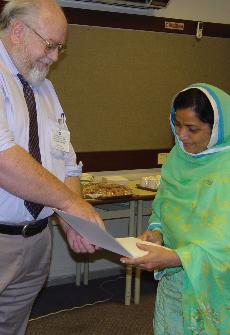Pakistan a familiar destination for Edwards

Dr. Willie Edwards presents a certificate to one of his Pakistani students during an earlier trip. Edwards will spend most of the fall semester teaching in Pakistan.
Pakistan is the place to be for Dr. Willie Edwards.
Edwards, associate professor of teacher education, has been to Pakistan four times since 2006 to help train teachers. This coming semester, Edwards will be spending more than half of his time there.
“If we can do a better job of training, it will impact society,” Edwards said. “We will teach around 200 professors, who will teach 10,000 teachers, who will in turn teach thousands of children. It can have a great impact.”
A member of the International Reading Association, Edwards volunteered to help the higher education teachers of Pakistan better train their students. The International Reading Association partners with the Research Triangle Institute to help implement the Education Sector Reform Action Plan, which calls for teacher training and literacy involvement.
A study by the University of Pennsylvania established criteria of what professional development in higher education should look like in thirteen Asian countries. Edwards and his team will take an assessment of the development in Pakistan and see what needs improvement and where they stand in comparison to the other countries. The study will be published in the South Asia Journal, among several others.
While in Pakistan, Edwards and a team of teachers will be meeting with faculty from the University of Balochistan to figure out what type of training these professors need. The team will lead seminars to give the teachers fresh instructional ideas. Many of the teachers in Pakistan rely on lecture, and there are few opportunities for hands-on activities.
A heavily populated country, Edwards describes Pakistan as having an “uneven educational system.”
The population is a little more than half that of the United States and fills a space more than two times the size of California. Pakistan borders China, India, Iran and Afghanistan, although it is not considered a Middle Eastern country, because its population is not Arab.
“They are just in a bad neighborhood,” Edwards said.
He volunteered for more than 20 years with the International Reading Association, but after arriving at Missouri Southern he considered travel.
“The international mission of MSSU really got me thinking,” Edwards said. “I talked to people who knew people and then got involved in traveling to Pakistan.”
Teaching in another country gives Edwards relevant experience to pass on to his students.
Granted sabbatical from Southern, Edwards realizes how important it is to develop more theoretical methods of teaching.
Dr. Glen Coltharp, dean of the School of Education, likes the positive impact Edwards has on his students.
“In Education in a Global Society class, the students study how students in other countries are educated” Coltharp said. “After spending a semester observing schools and working with teachers in Pakistan and Bangladesh, Dr. Edwards will gain a great deal of experience he will be able to share with students in this class.”
Professional development aside Edwards looks forward to traveling again soon.
“I like different cultures,” he said “I like to see the similarities and differences, especially in our values. I also like seeing what the U.S. is doing to help and how the money we have given has been used.”
Edwards finds teaching the Pakistani instructors rewarding.
“I have learned more from the Pakistani people than I have taught them. They all have such a desire to learn,” Edwards said.
Your donation will support the student journalists of Missouri Southern State University. Your contribution will allow us to purchase equipment and cover our annual website hosting costs.















